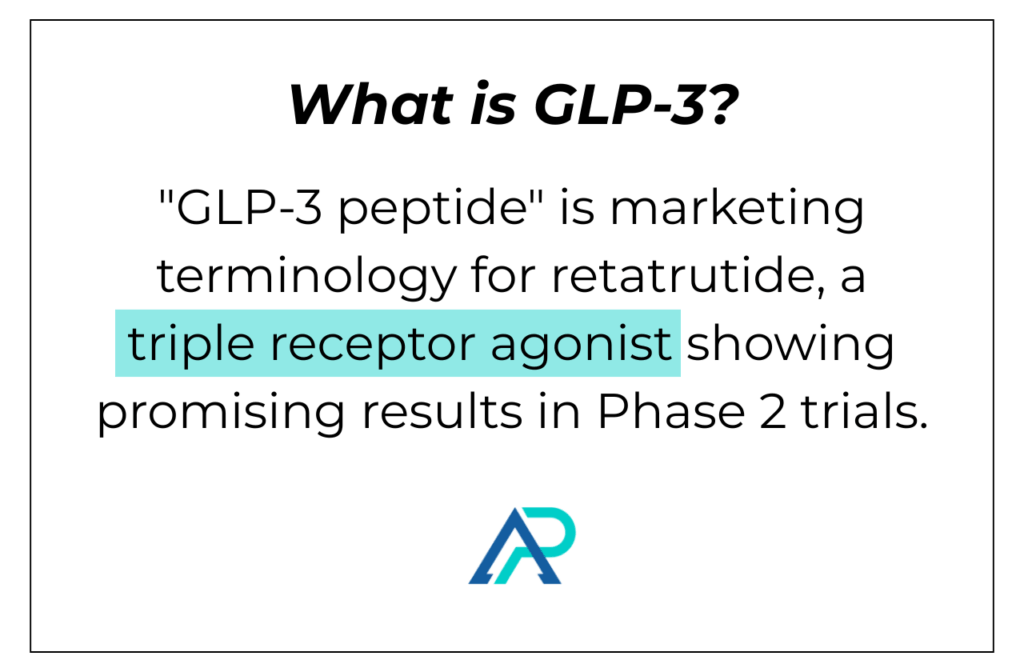This article is for informational purposes only and does not constitute medical advice. Always consult with a qualified healthcare provider before considering any peptide therapy.
You’ve probably heard clinics marketing “GLP-3 peptide” as the next weight loss breakthrough. Here’s what you need to know: there is no GLP-3 peptide in human biology.
The term “GLP-3” is a marketing nickname for retatrutide, a triple receptor agonist that targets GLP-1, GIP, and glucagon receptors. The only true GLP-3 exists in cartilaginous fish like sharks and regulates ketone metabolism, with no relevance to human obesity treatment(1).
This guide cuts through the confusion to explain what retatrutide actually is, how it works, and what the clinical data shows.
Quick Takeaways
- “GLP-3 peptide” is misleading marketing terminology for retatrutide, an investigational triple receptor agonist that is not yet FDA-approved
- Clinical trials show retatrutide produces up to 24.2% body weight loss over 48 weeks, surpassing current weight loss peptides
- Common side effects include nausea, vomiting, and diarrhea, which typically decrease over time
- Retatrutide remains in Phase 3 trials and is only available through clinical studies or unregulated sources that pose safety risks
What Is “GLP-3” Peptide?
The term GLP-3 creates confusion by suggesting a new hormone discovery. In reality, clinics adopted this nickname to differentiate retatrutide from existing medications.
Their simplified naming system positions GLP-1 (glucagon-like peptide-1) drugs as single agonists, “GLP-2 drugs” as dual agonists, and “GLP-3” as triple agonists. This convention is scientifically inaccurate and misrepresents how these medications function(2).
The True GLP Family
Human biology produces only two GLP peptides from the proglucagon gene: GLP-1 and GLP-2. Both stem from tissue-specific processing in the intestine and brain.
GLP-2 functions as an intestinal growth factor. The FDA approved it as teduglutide (Gattex) for short bowel syndrome, not weight loss(3). It enhances intestinal repair and nutrient absorption through completely different pathways than weight loss medications.

What Is Retatrutide?
Retatrutide (LY3437943) is an investigational peptide developed by Eli Lilly that activates three metabolic hormone receptors at once(4). This 39-amino acid synthetic peptide earned the designation “triple agonist” for its unique mechanism.
The medication remains in Phase 3 clinical trials. It has not received FDA approval for any indication.
How Retatrutide Differs From Current Medications
Here’s how retatrutide compares to approved weight loss drugs:
| Medication | Mechanism | Average Weight Loss (48 weeks) |
|---|---|---|
| Semaglutide (Wegovy) | GLP-1 agonist | ~15% body weight |
| Tirzepatide (Zepbound) | GLP-1/GIP dual agonist | ~22.5% body weight |
| Retatrutide | GLP-1/GIP/Glucagon triple agonist | ~24.2% body weight |
Retatrutide produced 4.3 kg (9.5 lb) greater weight reduction compared to tirzepatide at the highest doses studied(5).
How Does Retatrutide Work?
Retatrutide activates three distinct receptors that regulate metabolism, appetite, and energy balance.
GLP-1 Receptor Activation
This pathway increases insulin secretion, slows gastric emptying, and reduces appetite through effects on brain satiety centers. Retatrutide shows 2.5-fold less potency than native GLP-1 at this receptor(6).
GIP Receptor Activation
GIP enhances insulin sensitivity and promotes healthy fat storage while reducing harmful ectopic fat distribution. Retatrutide demonstrates 8.9-fold more potency than native GIP(7).
Glucagon Receptor Activation
This third pathway sets retatrutide apart from dual agonists. Glucagon activation increases energy expenditure, promotes fat breakdown, and enhances metabolic rate. The compound shows 2.9-fold less potency than native glucagon(2).
The combination creates synergistic effects that appear to exceed single or dual receptor activation.
Pharmacokinetics
Key characteristics include:
- 80% bioavailability via subcutaneous injection
- 5-6 day half-life enabling once-weekly dosing
- 99% plasma albumin binding
- Metabolized into amino acids through proteolytic cleavage
What Do Clinical Trials Show?
Phase 2 studies provide the most comprehensive data on retatrutide’s effects.
Weight Loss Results
A landmark 48-week trial in 338 adults with obesity (mean BMI 37.3 kg/m²) without diabetes demonstrated unprecedented results(4):
At 24 weeks:
- 1 mg dose: 7.2% weight loss
- 4 mg dose: 12.9% weight loss
- 8 mg dose: 17.3% weight loss
- 12 mg dose: 17.5% weight loss
- Placebo: 1.6% weight loss
At 48 weeks:
- 12 mg dose achieved 24.2% body weight loss (approximately 58 pounds)
- 100% of participants lost at least 5% of body weight
- 93% lost at least 10% of body weight
- 83% lost at least 15% of body weight
Dr. Ania Jastreboff, lead investigator at Yale School of Medicine, noted: “Participants treated with the highest dose of retatrutide achieved a mean weight reduction of 24.2%; this translates to an average absolute weight reduction of about 58 pounds over 11 months of the study.”
Patients continued losing weight through 48 weeks with no plateau observed.
Type 2 Diabetes Results
A 36-week trial in 281 adults with type 2 diabetes compared retatrutide to dulaglutide (a GLP-1 agonist)(8):
- HbA1c reduction: 1.3% to 2.0% across retatrutide doses
- Weight loss: 16.9% (37.8 lb) at 12 mg dose vs. 3.0% with dulaglutide
- 72% of participants with prediabetes reverted to normal glucose levels
Liver Health Benefits
In a Phase 2a substudy of 98 participants with fatty liver disease, retatrutide showed remarkable effects at 24 weeks(9):
- 12 mg dose: 82.4% reduction in liver fat
- 86% of participants achieved normal liver fat levels (<5%)
- Placebo group: 0.3% increase in liver fat
Cardiometabolic Improvements
Across trials, retatrutide improved multiple health markers:
- Systolic blood pressure reductions: 5-10 mm Hg
- Lower total cholesterol, LDL cholesterol, and triglycerides
- Waist circumference reductions: 6.5 to 19.6 cm
Third-Party Tested, 99% Purity
Order lab-verified peptides from our top recommended vendor.

What Are the Side Effects?
Most adverse events involve the digestive system and increase with higher doses.
Common Gastrointestinal Effects
The most frequently reported side effects include:
- Nausea: 40-60% at higher doses
- Vomiting: up to 16%
- Diarrhea: common but transient
- Constipation: frequent but manageable
These symptoms typically appear during dose escalation and decrease as your body adapts. Most cases are mild to moderate.
Cardiovascular Considerations
Studies observed modest increases in resting heart rate (5-10 beats per minute) that declined by weeks 36-48. Blood pressure and cholesterol levels improved across trials.
Discontinuation Rates
7-17% stopped retatrutide due to adverse effects compared to 0-4% with placebo(10). These rates align with other GLP-1 and dual agonist medications.
Serious adverse events occurred in approximately 4% of both treatment and placebo groups, with no confirmed signals for pancreatitis, major cardiovascular events, or liver toxicity.
Is Retatrutide Legal?
Retatrutide remains an investigational drug. The FDA has not approved it for any medical use.
Current Regulatory Status
You can only access retatrutide legally through enrollment in clinical trials. The Phase 3 TRIUMPH program is ongoing, with results expected in 2025-2026.
Understanding whether peptides are legal requires careful attention to regulatory status and source legitimacy.
Black Market Concerns
The FDA issued warnings about counterfeit retatrutide being sold online and through unauthorized wellness clinics. These products may contain:
- Incorrect doses
- Toxic ingredients
- No active ingredient at all
Personal trainers and unregulated clinics have marketed boxes labeled as “retatrutide from Swiss labs” despite no approved generic version existing(11).
What This Means for You
If a clinic offers “GLP-3 peptide,” ask specifically if they mean retatrutide. Verify they can provide legitimate sourcing documentation. Remember that this medication lacks FDA approval and long-term safety data.
What Should You Know About Treatment?
Clinical trials included dietary counseling and lifestyle interventions alongside medication. Weight loss peptides work best when combined with nutrition guidance and physical activity.
Realistic Expectations
Peak weight loss occurs over 36-48 weeks, not immediately. Gradual dose escalation minimizes gastrointestinal side effects and improves tolerance.
Women showed more weight loss than men at equivalent doses in obesity trials. Younger patients may have enhanced responsiveness to incretin therapies.
Monitoring Requirements
Regular follow-up with healthcare providers tracks heart rate, blood pressure, liver function, and kidney function. This monitoring identifies potential issues early.
The Bottom Line
“GLP-3 peptide” is marketing terminology for retatrutide, a triple receptor agonist showing promising results in Phase 2 trials. The compound demonstrates superior weight loss compared to current medications, with 24.2% average weight reduction over 48 weeks.
Retatrutide remains investigational. It lacks FDA approval and long-term safety data. Access outside clinical trials involves counterfeit products that pose serious health risks.
If you’re interested in retatrutide, speak with your healthcare provider about clinical trial opportunities or FDA-approved alternatives while awaiting regulatory approval.
References
- Weinrauch AM, Bouyoucos IA, Conlon JM, Anderson WG. The chondrichthyan glucagon-like peptide 3 regulates hepatic ketone metabolism in the Pacific spiny dogfish Squalus suckleyi. Vol. 350, General and Comparative Endocrinology. Elsevier BV; 2024 May p. 114470. https://doi.org/10.1016/j.ygcen.2024.114470
- Katsi V, Koutsopoulos G, Fragoulis C, Dimitriadis K, Tsioufis K. Retatrutide—A Game Changer in Obesity Pharmacotherapy. Vol. 15, Biomolecules. MDPI AG; 2025 May p. 796. https://doi.org/10.3390/biom15060796
- Abdalqadir N, Adeli K. GLP-1 and GLP-2 Orchestrate Intestine Integrity, Gut Microbiota, and Immune System Crosstalk. Vol. 10, Microorganisms. MDPI AG; 2022 Oct p. 2061. https://doi.org/10.3390/microorganisms10102061
- Jastreboff AM, Kaplan LM, Frías JP, Wu Q, Du Y, Gurbuz S, et al. Triple–Hormone-Receptor Agonist Retatrutide for Obesity — A Phase 2 Trial. Vol. 389, New England Journal of Medicine. Massachusetts Medical Society; 2023 Aug p. 514–526. https://doi.org/10.1056/nejmoa2301972
- Salhab A, Maraqah H, Habes Y, Abusabha M, Ayesh H. SUN-659 Comparative Efficacy and Safety of Tirzepatide vs Retatrutide in Weight Loss: A Network Meta-Analysis of Clinical Trials. Vol. 9, Journal of the Endocrine Society. The Endocrine Society; 2025 Oct. https://doi.org/10.1210/jendso/bvaf149.169
- Liu QK. Mechanisms of action and therapeutic applications of GLP-1 and dual GIP/GLP-1 receptor agonists. Vol. 15, Frontiers in Endocrinology. Frontiers Media SA; 2024 Jul. https://doi.org/10.3389/fendo.2024.1431292
- Melson E, Ashraf U, Papamargaritis D, Davies MJ. What is the pipeline for future medications for obesity?. Vol. 49, International Journal of Obesity. Springer Science and Business Media LLC; 2024 Feb p. 433–451. https://doi.org/10.1038/s41366-024-01473-y
- Rosenstock J, Frias J, Jastreboff AM, Du Y, Lou J, Gurbuz S, et al. Retatrutide, a GIP, GLP-1 and glucagon receptor agonist, for people with type 2 diabetes: a randomised, double-blind, placebo and active-controlled, parallel-group, phase 2 trial conducted in the USA. Vol. 402, The Lancet. Elsevier BV; 2023 Aug p. 529–544. https://doi.org/10.1016/s0140-6736(23)01053-x
- Sanyal AJ, Kaplan LM, Frias JP, Brouwers B, Wu Q, Thomas MK, et al. Triple hormone receptor agonist retatrutide for metabolic dysfunction-associated steatotic liver disease: a randomized phase 2a trial. Vol. 30, Nature Medicine. Springer Science and Business Media LLC; 2024 Jun p. 2037–2048. https://doi.org/10.1038/s41591-024-03018-2
- Pasqualotto E, Ferreira ROM, Chavez MP, Hohl A, Ronsoni MF, Pasqualotto T, et al. Effects of once-weekly subcutaneous retatrutide on weight and metabolic markers: A systematic review and meta-analysis of randomized controlled trials. Vol. 24, Metabolism Open. Elsevier BV; 2024 Dec p. 100321. https://doi.org/10.1016/j.metop.2024.100321
- Mahase E. Weight loss jabs: Patients are using black market to obtain drugs still in clinical trials, experts warn: Video 1. Vol. 390, BMJ. BMJ; 2025 Sep p. r1917. https://doi.org/10.1136/bmj.r1917